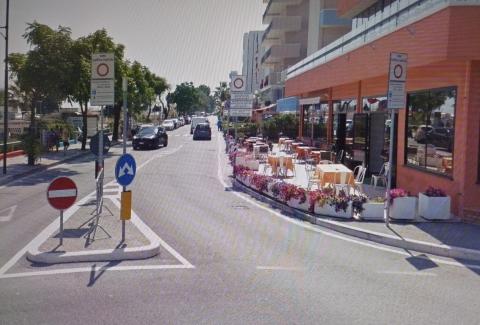Rimini's TLZ expansion for more efficient logistics in Parco del Mare

About this good practice
In Parco del Mare of Rimini, where tourists flock and businesses thrive, a huge challenge has been the congestion mainly caused by delivery vehicles. The municipality has responded with an innovative solution: the expansion of their Traffic Limited Zone (TLZ) system to Viserba, marking a milestone in Rimini's journey toward sustainable urban logistics and mobility.
Launched in April 2024, this initiative builds upon Rimini's existing network of TLZs, targeting the twin challenges of traffic congestion and environmental impact. Within just the first months, the project has shown promising signs of success, demonstrating a noticeable reduction in motorized delivery vehicles, that found a way to centralise deliveries in a more efficient way, and private cars in the restricted zones.
The initiative benefits both local citizens and tourists. Restaurants and hotels, previously dependent on constant vehicular deliveries, are now served through a more streamlined and regulated system. While precise CO2 reduction data is still pending, the visible decrease in traffic flow suggests positive environmental implications.
Resources needed
An investment of 25,000 euros, supported by regional funding, has enabled this transformation. The operational costs primarily revolve around maintaining the electronic access control systems that regulate entry to the TLP area.
Evidence of success
The success of this practice relies on two key pillars: improved safety and enhanced environmental quality due to the restrictions on traffic, that is highly reduced making streets safer for pedestrians, encouraging active lifestyles, and lower vehicle emissions and cleaner air. This practice is considered good for the following reasons:
Safety
Health
Environment
Potential for learning or transfer
What makes this initiative noteworthy is its scalability and transferability. Even if TLZ are not a new concept, Rimini's approach to expanding these zones across different areas of the municipality offers valuable lessons for other regions. The positive reception from both citizens and tourists underscores the viability of such sustainable urban governance measures.
The initiative faces the ongoing challenge of expanding to new territories, but its success in Rimini serves as a compelling case study for other regions grappling with similar logistics and mobility challenges. The progressive implementation across different areas of Rimini demonstrates how such systems can be gradually introduced while maintaining public support and operational efficiency.
This practice exemplifies how targeted urban mobility interventions can create effects across multiple aspects of city life - environmental quality , public health and more efficient and concentrated deliveries.

